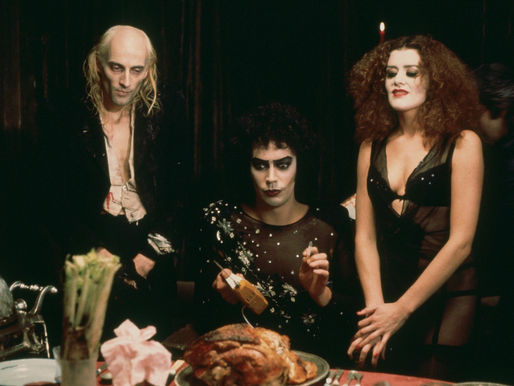top of page
Search
1970's
Classic Films from the 1970's


The Andromeda Strain (1971)
The Andromeda Strain is a taut, cerebral science fiction thriller that brought a new kind of realism to the genre in the early 1970s. Adapted from Michael Crichton’s breakout 1969 novel and directed by Robert Wise—already well-established from films like The Day the Earth Stood Still and West Side Story—this film stands apart from its contemporaries with a tone of cold precision and scientific authenticity.

Soames Inscker
5 min read


The Way We Were (1973)
The Way We Were is a film that pulses with nostalgia, regret, and yearning—an earnest, bittersweet exploration of love that could not withstand the weight of time and ideology. Directed by Sydney Pollack and released in 1973, it pairs two major stars at the peak of their magnetism: Barbra Streisand, with her fiercely intelligent presence, and Robert Redford, at his most golden and effortlessly charismatic.

Soames Inscker
4 min read


Love Story (1970)
At its core, Love Story is a simple, tragic romance. Oliver Barrett IV (Ryan O’Neal) is a privileged, Ivy League law student from a wealthy, emotionally distant family. Jennifer Cavalleri (Ali MacGraw) is a working-class music student with a sharp tongue and a fierce intellect. They meet at Harvard, fall in love, and defy Oliver’s overbearing father (Ray Milland) by marrying against his wishes.

Soames Inscker
3 min read


Marathon Man (1976)
The story centres on Thomas "Babe" Levy (Dustin Hoffman), a Columbia graduate student and passionate long-distance runner who is unknowingly drawn into a deadly international conspiracy. His brother Doc Levy (Roy Scheider), a covert government agent, is murdered, and Babe soon finds himself pursued by sinister figures tied to the Nazi past.

Soames Inscker
3 min read


Silver Streak (1976)
Silver Streak (1976) is a delightful blend of comedy, action, romance, and mystery—an ambitious cinematic cocktail that helped establish the buddy-action formula that would flourish in the 1980s. Directed by Arthur Hiller and written by Colin Higgins (Harold and Maude, Foul Play), this film stands as a mid-’70s crowd-pleaser that combines Hitchcockian intrigue with slapstick humour and sly social commentary.

Soames Inscker
5 min read


The Jerk (1979)
The Jerk (1979) is one of the most iconic and influential American comedies of the late 20th century, launching Steve Martin from stand-up stardom to full-blown movie superstardom. Directed by veteran comedian and filmmaker Carl Reiner, The Jerk is an unapologetically absurd, slapstick-heavy, and irreverently satirical film that revels in its own silliness.

Soames Inscker
5 min read


10 (1979)
Released in 1979, 10 is a landmark romantic comedy written and directed by Blake Edwards, best known for his stylish comedies (The Pink Panther, Victor/Victoria). With 10, Edwards turned his attention inward, crafting a semi-autobiographical, frank, and often absurd portrayal of middle-aged male anxiety, sexual obsession, and the quest for perfection.

Soames Inscker
5 min read


What's Up Doc (1972)
In the early 1970s, American cinema was undergoing a radical transformation, with auteurs focusing on gritty realism and social commentary. Against this backdrop, Peter Bogdanovich’s What’s Up, Doc? stood out like a Technicolor fever dream — a pure, unapologetic comedy that paid tribute to the rapid-fire, madcap spirit of films like Bringing Up Baby, His Girl Friday, and The Awful Truth. Rather than feeling retro or out of place, it was a huge hit with critics and audiences a

Soames Inscker
5 min read


The Three Musketeers (1973)
Richard Lester’s 1973 adaptation of The Three Musketeers is one of the most energetic, irreverent, and stylish takes on Alexandre Dumas’s classic novel ever put to screen. Blending period-authentic detail with slapstick humour and modern wit, this version offers a refreshing departure from the more stately or romanticized adaptations that preceded it.

Soames Inscker
4 min read


Brannigan (1975)
Brannigan is a fascinating cultural artifact—an attempt to repackage the quintessential American cowboy hero, John Wayne, into the mould of a modern urban cop thriller set in 1970s London. Directed by Douglas Hickox and produced in the wake of Dirty Harry and The French Connection, the film represents both a genre experiment and a late-career pivot for its iconic star.

Soames Inscker
4 min read


Annie Hall (1977)
Woody Allen’s 1977 masterpiece Annie Hall is a landmark in the history of romantic comedies, marking a definitive shift in the genre’s tone and narrative style. Winner of four Academy Awards — including Best Picture, Best Director, Best Original Screenplay, and Best Actress for Diane Keaton — the film represents Allen at his most innovative and introspective. Both a love story and a post mortem of a relationship, Annie Hall broke cinematic conventions while exploring the neur

Soames Inscker
4 min read


Murder By Death (1976)
Murder by Death is a genre-savvy spoof that brings together caricatures of the world’s most famous fictional detectives — thinly veiled versions of Hercule Poirot, Miss Marple, Sam Spade, and Charlie Chan, among others — and places them in a haunted mansion for a mysterious dinner party. The film was penned by the legendary playwright and screenwriter Neil Simon, known for his sharp wit and theatrical flair.

Soames Inscker
4 min read


The Return of the Pink Panther (1975)
After a decade away from the role, The Return of the Pink Panther marked the triumphant comeback of Peter Sellers as the bumbling, absurdly self-confident Inspector Jacques Clouseau. It was also a revival for the franchise itself, which had faltered slightly after the 1964 hit A Shot in the Dark and the Sellers-less 1968 film Inspector Clouseau.

Soames Inscker
4 min read


Tommy (1975)
Tommy is a surreal, audacious rock musical directed by the flamboyant British auteur Ken Russell, based on The Who’s 1969 concept album of the same name. The film is a psychedelic fever dream, built entirely around music and image rather than traditional dialogue or narrative structure. With its star-studded cast and genre-defying ambition, Tommy is both a product of its time and a lasting artifact of cinematic and musical experimentation.

Soames Inscker
4 min read


The Rocky Horror Picture Show (1975)
The Rocky Horror Picture Show is a transgressive, irreverent, and gloriously bizarre musical comedy-horror film that quickly outgrew its modest box office beginnings to become the ultimate cult classic. Based on the 1973 British stage musical by Richard O’Brien, the film is a madcap tribute to B-movies, sci-fi serials, glam rock, and sexual liberation.

Soames Inscker
4 min read


Monty Python and the Holy Grail (1975)
Monty Python and the Holy Grail is a comedic tour de force that turns the medieval legend of King Arthur into a gleefully absurd farce. Directed by two of the Monty Python troupe’s key members — Terry Gilliam and Terry Jones — and performed by the entire group in multiple roles, the film is a subversive, self-aware parody of chivalric myths, storytelling conventions, and historical epics.

Soames Inscker
4 min read


Death Wish (1974)
Death Wish is a gritty and provocative film that became one of the most controversial movies of the 1970s. Directed by Michael Winner and starring Charles Bronson in his career-defining role, the film explores the psychological and moral transformation of a peaceful man into a lethal vigilante in response to personal tragedy and the unchecked crime in his city.

Soames Inscker
4 min read


The Taking of Pelham One Two Three (1974)
Set entirely within and around the labyrinthine subway system of 1970s New York City, The Taking of Pelham One Two Three is a high-concept heist thriller that delivers both pulse-pounding suspense and a wry, streetwise sense of humour.

Soames Inscker
4 min read


Earthquake (1974)
Earthquake (1974) was released at the peak of the 1970s disaster movie craze, a trend kicked off by Airport (1970) and further fuelled by The Poseidon Adventure (1972) and The Towering Inferno (also 1974). But Earthquake distinguished itself not only through its large-scale urban devastation but also through the innovative use of "Sensurround", a then-revolutionary theatre sound system designed to simulate the rumble of an actual quake.

Soames Inscker
4 min read


Young Frankenstein (1974)
Young Frankenstein is both a razor-sharp parody and a loving tribute to the classic Universal monster movies of the 1930s — particularly James Whale’s Frankenstein (1931) and Bride of Frankenstein (1935). Co-written by Gene Wilder and directed by Mel Brooks, the film is a rare feat: a comedy that manages to be wildly funny, visually sophisticated, and emotionally endearing all at once.

Soames Inscker
4 min read
bottom of page


